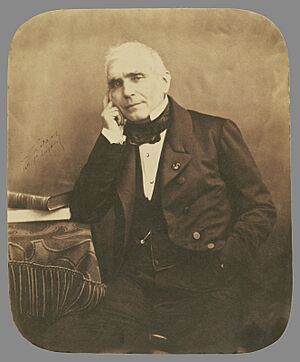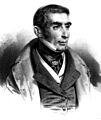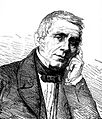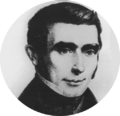Eugène Scribe facts for kids
Augustin Eugène Scribe (born December 24, 1791 – died February 20, 1861) was a French writer who created plays and libretti (the words for operas). He is famous for making the "well-made play" very popular. This type of play was a big hit in theaters for over 100 years. He also wrote the words for many successful grand operas.
Contents
About Eugène Scribe
Eugène Scribe was born in Paris, France, and he also passed away there. His father was a silk merchant, and Eugène received a good education. He was supposed to study law, but he soon started writing for the stage instead.
His very first play, Le Prétendu sans le savoir, was shown in 1810. It was not a success. He wrote many other plays with different co-writers. Scribe finally found success in 1815 with a play called Une Nuit de la garde nationale (Night of the National Guard). He often worked with others throughout his career.
In 1822, Scribe started writing more serious comedies. His play Valérie was a big hit at the Théâtre Français. He wrote many successful plays for famous actors like Mlle Mars and Rachel. In 1834, Scribe was chosen to be a member of the Académie Française, a very important French group that looks after the French language.
The "Well-Made Play"
Scribe mostly wrote about everyday people from the middle class. He became very good at writing comédies vaudevilles. These were short, fun plays for middle-class audiences, often including songs.
Eventually, he created a special way of writing plays called the "well-made play." These plays were popular because they had clever and surprising plots. They often centered on a misunderstanding (called a quiproquo) that the audience knew about early on, but the characters didn't figure out until the very end. Characters would face many problems, and solving one problem might lead to new ones. At the end, there was a big scene with shocking discoveries, leading to an exciting finish.
Even though people thought his plays were clever, they didn't have very deep language, characters, or ideas. They were quite different from the Romantic plays of the same time, like those by Victor Hugo. A writer named Théophile Gautier once wondered how Scribe, who didn't use much poetry or deep style, could be the most successful writer of his time!
Scribe's Writing Style and Collaborations
Scribe wrote a lot! He created many different types of plays, including comedies, tragedies, and libretti for operas. It's said that he wrote 150 plays just for the Théâtre du Gymnase theater before 1830.
He worked with many co-writers, almost like a "factory." One person might come up with the story, another would write the conversations, and someone else would add the jokes. He even sent money to people for "ideas" he got from their work, even if they didn't know he used them. Some of his co-writers included Jean Henri Dupin, Germain Delavigne, and Ernest Legouvé.
Scribe's Opera Libretti
Because Scribe's plays were so well-structured, they were perfect for turning into operas. The way he built his stories allowed for different musical parts and exciting moments for groups of singers.
Scribe wrote the words (libretti) for operas by many famous composers of his time. Many of these libretti were for shows at the Paris Opéra. They helped change the way French opera was made.
He worked often with Giacomo Meyerbeer. He also wrote words for operas by Giuseppe Verdi (like Les vêpres siciliennes), Vincenzo Bellini, Daniel Auber (like La muette de Portici), Fromental Halévy (like La Juive), François-Adrien Boieldieu, Gaetano Donizetti, and Gioachino Rossini. When he died, he was still working on the words for Meyerbeer's opera L'Africaine.
Scribe had a very practical view of his own libretti. In 1841, he had a disagreement about payment with the director of the Opéra. Scribe said, "I want to be paid for them based on how much money they bring in, which is a lot. The director only wants to pay for them based on what they are worth, which is very little."
Scribe also wrote a few novels, but they were not very well known. All of his collected works were published in 76 volumes between 1874 and 1885.
Works
See also Category: Libretti by Eugène Scribe and Category:Plays by Eugène Scribe
Plays by Eugène Scribe
- 1826: Bertrand et Suzette; ou Le Mariage de raison
- 1833: Bertrand et Raton, ou l'art de conspirer (The School for Politicians)
- 1842: Une Chaine
- 1842: Le Verre d'eau (The Glass of Water)
- 1849: Adrienne Lecouvreur, with Legouvé
- 1851: La Bataille de Dames (The Ladies' Battle)
Plays Adapted into Opera Libretti
Some of Scribe's plays were later turned into opera libretti by other writers.
- 1831: A ballet-pantomime became the basis for the Italian libretto for Bellini's La sonnambula
- 1832: Le philtre was adapted by Felice Romani into the libretto for Donizetti's L'elisir d'amore
- 1902: Adriana Lecouvreur (written with Ernest Legouvé) was adapted into a libretto by Arturo Colautti for Francesco Cilea's Adriana Lecouvreur
Principal Libretti by Scribe
These are some of the main opera libretti Scribe wrote.
- 1825: Boieldieu's La dame blanche (based on five works by Walter Scott)
- 1828: Revisions to a libretto by Germain Delavigne for Auber's La muette de Portici (The Mute Girl of Portici)
- 1828: Rossini's Le comte Ory
- 1830: Auber's Fra Diavolo
- 1831: Meyerbeer's Robert le diable (with Germain Delavigne)
- 1831: La marquise de Brinvilliers set by nine composers (with Castil-Blaze)
- 1831: Meyerbeer's Les Huguenots (with Émile Deschamps)
- 1833: Auber's Gustave III, ou Le bal masqué (Gustavus III, or The Masked Ball) (this was a model for Verdi's Un ballo in maschera)
- 1835: Halévy's La Juive
- 1843: Donizetti's Dom Sébastien (based on Paul-Henri Foucher's play)
- 1849: Meyerbeer's Le prophète (first show)
- 1855: Verdi's Les vêpres siciliennes (I vespri siciliani) (with Charles Duveyrier)
- 1856: Auber's Manon Lescaut
- 1865: Meyerbeer's L'Africaine (released after Scribe's death)
Honours
- 1847: He was made an Officer in the Order of Leopold in Belgium.
Filmography
Many films have been made based on Eugène Scribe's plays and opera libretti over the years.
- The Dumb Girl of Portici, directed by Phillips Smalley and Lois Weber (1916, based on the opera La muette de Portici)
- Feenhände, directed by Rudolf Biebrach (Germany, 1917, based on the play Les Doigts de fée)
- Masked Ball, directed by Alfréd Deésy (Austria-Hungary, 1917, based on the opera Un ballo in maschera)
- La Calomnie, directed by Maurice Mariaud (France, 1918, based on the play La Calomnie)
- Die Jüdin, directed by Luise Kolm and Jacob Fleck (Austria-Hungary, 1918, based on the opera La Juive)
- Adriana Lecouvreur, directed by Ugo Falena (Italy, 1919, based on the play Adrienne Lecouvreur)
- La moglie che si gettò dalla finestra, directed by Gian Bistolfi (Italy, 1920, based on the play Une femme qui se jette par la fenêtre)
- Dita di fata, directed by Nino Giannini (Italy, 1921, based on the play Les Doigts de fée)
- The Mute of Portici, directed by Arthur Günsburg (Germany, 1922, based on the opera La muette de Portici)
- A Glass of Water, directed by Ludwig Berger (Germany, 1923, based on the play Le Verre d'eau)
- The Faces of Love, directed by Carmine Gallone (Italy, 1924, based on the play Adrienne Lecouvreur)
- La muta di Portici, directed by Telemaco Ruggeri (Italy, 1924, based on the opera La muette de Portici)
- Der Kampf um den Mann, directed by Hans Werckmeister and Armand Guerra (Germany, 1928, based on the play La Bataille de Dames)
- Dream of Love, directed by Fred Niblo (1928, based on the play Adrienne Lecouvreur)
- The Black Domino, directed by Victor Janson (Germany, 1929, based on the opera Le Domino noir)
- Devil-May-Care, directed by Sidney Franklin (1929, based on the play La Bataille de Dames)
- Fra Diavolo, directed by Mario Bonnard (France, 1931, based on the opera Fra Diavolo)
- Fra Diavolo, directed by Mario Bonnard (Germany, 1931, based on the opera Fra Diavolo)
- The Devil's Brother, directed by Hal Roach (1933, based on the opera Fra Diavolo)
- The Ambassador, directed by Baldassarre Negroni (Italy, 1936, based on the play Le Diplomate)
- Adrienne Lecouvreur, directed by Marcel L'Herbier (France, 1938, based on the play Adrienne Lecouvreur)
- L'elisir d'amore, directed by Amleto Palermi (Italy, 1941, based on the opera L'elisir d'amore)
- The Queen of Navarre, directed by Carmine Gallone (Italy, 1942, based on the play Les Contes de la reine de Navarre)
- L'elisir d'amore, directed by Mario Costa (Italy, 1946, based on the opera L'elisir d'amore)
- Sicilian Uprising, directed by Giorgio Pastina (Italy, 1949, based on the opera Les vêpres siciliennes)
- La sonnambula, directed by Cesare Barlacchi (Italy, 1952, based on the opera La sonnambula)
- The Mute of Portici, directed by Giorgio Ansoldi (Italy, 1952, based on the opera La muette de Portici)
- Adriana Lecouvreur, directed by Guido Salvini (Italy, 1955, based on the play Adrienne Lecouvreur)
- A Glass of Water, directed by Helmut Käutner (West Germany, 1960, based on the play Le Verre d'eau)
Images for kids
See also
 In Spanish: Eugène Scribe para niños
In Spanish: Eugène Scribe para niños
 | Precious Adams |
 | Lauren Anderson |
 | Janet Collins |









